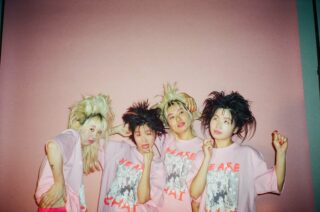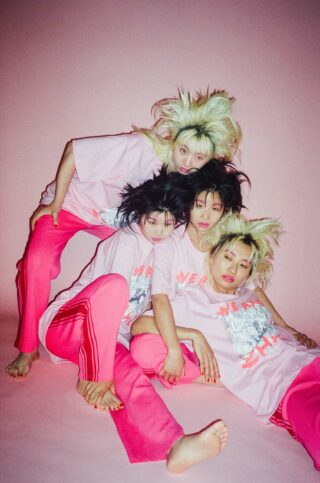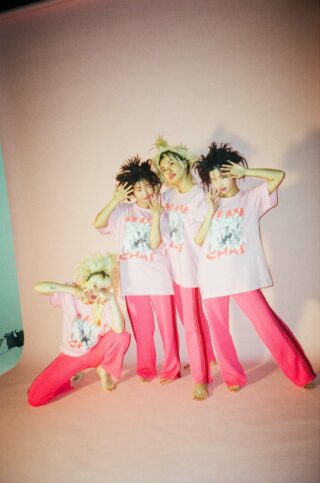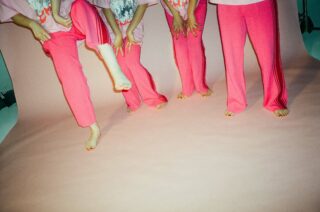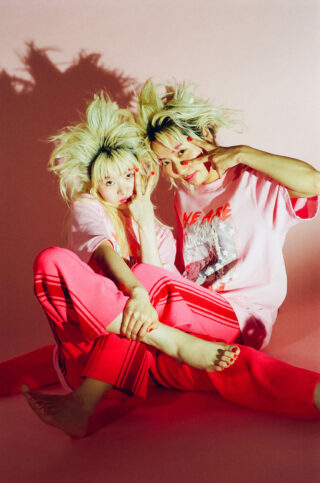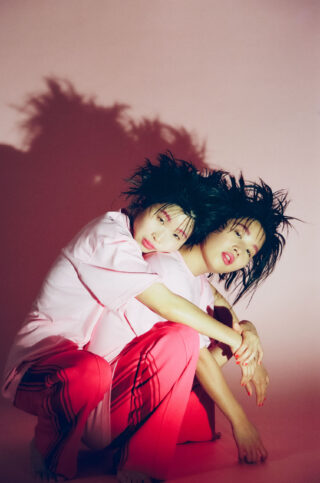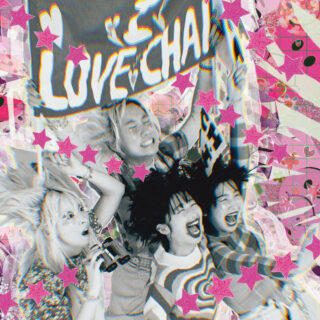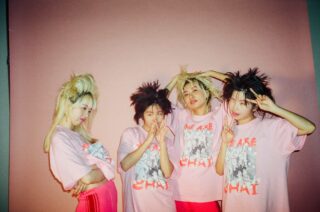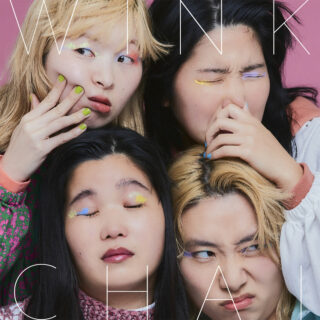But CHAI’s fourth album isn’t just a record of well-crafted nostalgia and callbacks to long-lost nuggets of Japanese youth culture. Throughout it, their lyrics challenge the idea of labelling people and pressuring them to conform. Instead, CHAI’s message is one of hope – an invitation to be true to yourself, persevere against adversity, have a voice, and use it. One song on the album that sums up the band’s inspiring message to the world is ‘GAME’. Intentionally blending elements of new wave, house synth lines and minimalistic production, it evokes Eurobeat influences reminiscent of Robyn’s Honey. It’s a track that perfectly articulates the band’s message to the world, grabbing listeners’ attention and calling on them to keep moving forward in life, embracing joy and finding their passion.
“It’s a song that’s very heavily influenced by ESG and Talking Heads and very much represents the new wave that we’re inspired by right now,” says Mana. “In terms of the lyrics, it’s about how playing games isn’t about winning or losing, but how you strategise to win the next game. Life is the same; just because you lose doesn’t mean it’s the end of everything; it’s more about what you take from that loss and use for the next challenge. It’s a song about always moving forward.”
This desire to constantly push both sonic and societal boundaries is, to me at least, the reason why CHAI are a punk band in the rawest sense of the term. Musically, they might not be as brash and furious as Fugazi, Bikini Kill or The Clash, but philosophically, they’re tracking the same trajectory. From the concept of neo-kawaii to the lyrical content of each song, CHAI’s music is in service of a mission to push back against societal norms and expectations, and although they’re cautious of describing their work as feminist, their keen to ensure that there’s a female-centric perspective to their approach. While tackling topics such as body image, beauty standards and the importance of individuality, the band’s politics are undeniably politicised, challenging the notion of conformity and encouraging women to find solidarity in self-acceptance. If this sounds radical, the band certainly doesn’t see it that way. When I ask the band if they see themselves as a political band, Mana shrugs.
“Basically, we’re just being ourselves,” she answers like it’s not a big deal. “I guess we’re confident in living as females. We just want to get the message out, via song, that it doesn’t matter who you are, in terms of gender or how you identify; our message is that it’s just about being confident.”
“We’re all multifaceted people, and we think everyone is the same,” agrees Una. “By showing that women can be confident and overcome borders by shouting it out through song, we are saying to everyone else that it’s OK to be who they are, regardless of age or diversity.”
The reason CHAI’s radicalism feels different to Western eyes though, is because it’s not confrontational, in-your-face, or even that openly political. Instead, the four-piece’s want to change the world and people’s thinking hangs on the sheer power of positivity. If a trend has emerged from their last four albums, it’s the band’s self-declared mission to shape their music, image and community to create a safe space where their message can be heard, received and acted on.
Earlier in this piece I mentioned that the secret to CHAI’s power lies in their ability to create their worlds, but it’s only now, with the release of their self-titled album, that the size and scale of what the band are building is starting to reveal itself. Like a team of terraformers creating lakes, rivers and forests out of barren rock, CHAI are carving out and defining a whole new ecosystem in indie rock where it’s okay to be whoever you want to be. It’s a space not just reserved for themselves, either, but also for their fans. From energetic live performances designed to create an atmosphere of joy and liberation to lyrics that empower their audience to express themselves freely, almost every facet of CHAI’s music points outward.

In their words, the future world that their is building is something called “Chai Pop”. “We want to make our own genre and update it and evolve it in the future,” Mana tells me, almost triumphantly, describing her vision for the band’s next stage like an architect describing their next skyscraper. “I have no idea how it will sound, but it’s what we aspire to do in the future.”
“My hope is that it will keep inspiring people,” agrees Yuna. “Hopefully, people will continue to see a group of Japanese-Asian women being energetic on stage and performing with everything we can, and from that more and more people will say, ‘Okay, we can be confident in who we are and do whatever we want to do in life.’ This year, I want people to come and see this new version of CHAI 2.0 out on tour and come away feeling inspired.”
The final word falls to Yukki, returning the focus to the fans in typical CHAI fashion. “Every single conversation I have with the people I wouldn’t have met if I weren’t in this band, fans, as well as the people around us who support us, are so precious, and those experiences motivate me to want to share our message to more people. Every person I meet has something I don’t have, and because I am experiencing first-hand that everyone is amazing in their own way, I want everyone to be prouder of themselves. I hope that CHAI’s songs can let everyone realise that.”




